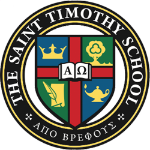OUR CURRICULUM
The Saint Timothy School curriculum offers a solid academic foundation in its program of study.
Grammar - Logic - Rhetoric
Using the time-honored “trivium,” (three-fold way) and its three stages of learning as a guide, curriculum materials are carefully chosen from select publishers to ensure that students in the Grammar stage (K-6th) acquire the necessary phonetic, reading, arithmetic, and writing skills in traditional core subjects.
Coursework mastered in the Grammar stage is built upon in subsequent study in the Dialectic and Rhetoric stages (7th-12th). In the Dialectic (logic) stage emphasis is given to developing critical reading and thinking skills through the use of original sources.
The Rhetoric stage focuses upon the cultivation of effective and persuasive communication skills in original research, reports, and presentations. It also often includes participation in foreign travel. The courses for 7th-12th grade students are college preparatory in nature, satisfying necessary college entrance requirements.
ON CLASSICAL EDUCATION
What is Christian, classical education?
The goal of a Christian classical education is to educate students in the wisdom of the ages for the sake of Christ’s kingdom.
But what does that really mean, and how do we do it?
Our children live in a bewildering world—where technology paradoxically connects users to the other side of the globe, while heightening feelings of isolation, a world where the virtues have less and less meaning; where politics decreasingly serves the public good; where any sense of heritage increasingly crumbles into chaos; and where increasing violence and economic instability renders the future uncertain.
So how can we equip our children to live well in this world?
At The Saint Timothy School, we believe that to address the problems of the present, we must look backward as well as forward. An education rooted in the accumulated wisdom of thousands of years is still available. It is the education of our forefathers—the education which has shaped leaders for generations, and is still doing just that.
The goal of a classical, Christian education is to cultivate the whole person. This education stands on three legs: outstanding academics in a tutorial-style setting, a rigorous and broad arts program, and (last but most importantly) true spiritual formation.
Our highest goal is that our students know and love the truth. Our small size allows our teachers work individually with students on a daily basis, training them towards mastery. Daily, our students grapple with the best that has been written and thought, finding their own places within that tradition. They learn the difference between "self-expression" and "the self expressing truth, beautifully."
We believe that the arts are essential to a sacramental attitude and worldview. The musical arts (choir, and orchestra), the fine and manual arts (drawing and hand tools shop), and the dramatic arts shape our students' loves. As knowledge transforms the mind, so beauty woos the heart, and goodness draws desire.
Articles & Essays
Included here are articles and essays on classical education as well as issues relating to the Christian Faith and Western culture.
The What and Why of a Classical Education by Susan Wise Bauer. Just what is a “classical” education, and why should I want it for my child? In answer to that we offer this excerpt from The Well-Trained Mind: A Guide to Classical Education at Home by Susan Wise Bauer.
The Lost Tools of Learning by Dorothy Sayers. In this essay, Miss Sayers suggests that we presently teach our children everything but how to learn. She proposes that we adopt a suitably modified version of the medieval scholastic curriculum for methodological reasons.
The Abolition of Man by C.S. Lewis. A masterful reflection on the state of modern education. This is a free PDF version of the book in its entirety.
A Christian Mind by Harry Blamires.
Education Sites
The Anglican School Association - The Anglican School Association supports member schools in fulfilling the spiritual, intellectual, and moral objectives of an Anglican educational program by certifying that established standards to that end have been met and will be sustained by a continuous process of self-evaluation and self-improvement.
The Society for Classical Learning - The Society for Classical Learning (SCL) has existed since the mid-1990s to facilitate and encourage thinking and discussion among professionals associated with Christ-centered education in the liberal arts tradition. The Society provides a forum in which educators can share wisdom, experience, and ideas as they deepen their understanding of classical theory into everyday, real world education. The Society is committed to historic Christianity as expressed in the Nicene Creed and to exploring the relationship of Christ to the broader culture.
Circe Institute - The mission of the CiRCE Institute is to support teachers and parents who want to cultivate wisdom and virtue in their students through the truths of Christian classical education.
Association of Classical Christian Schools - A public advocate for classical Christian education. We offer an extensive array of member services to help build distinctive schools. And, we provide accountability through accreditation. The ACCS seeks to set an educational standard for a unified and directed approach to classical and Christian learning.
Classical Learning Initiatives - Classic Learning Initiatives was founded by Jeremy Tate in 2015, to provide alternative standardized tests rooted in tradition and taking advantage of modern technologies. Featuring passages selected from great works across a variety of disciplines, the CLT suite of assessments provide a highly accurate and rigorous measure of reasoning, aptitude, and academic formation for students from diverse educational backgrounds. The exams are taken online in just two hours, and all three assessments (CLT, CLT10, CLT8) give same-day test results. The CLT also provides colleges and secondary schools with detailed information about student learning trends, to facilitate decisions about admissions, curricula, and instruction. Our team unites a dedicated group of educators, business people, and scholars, all in service to a shared passion: to reconnect intellectual pursuit with the pursuit of virtue.



